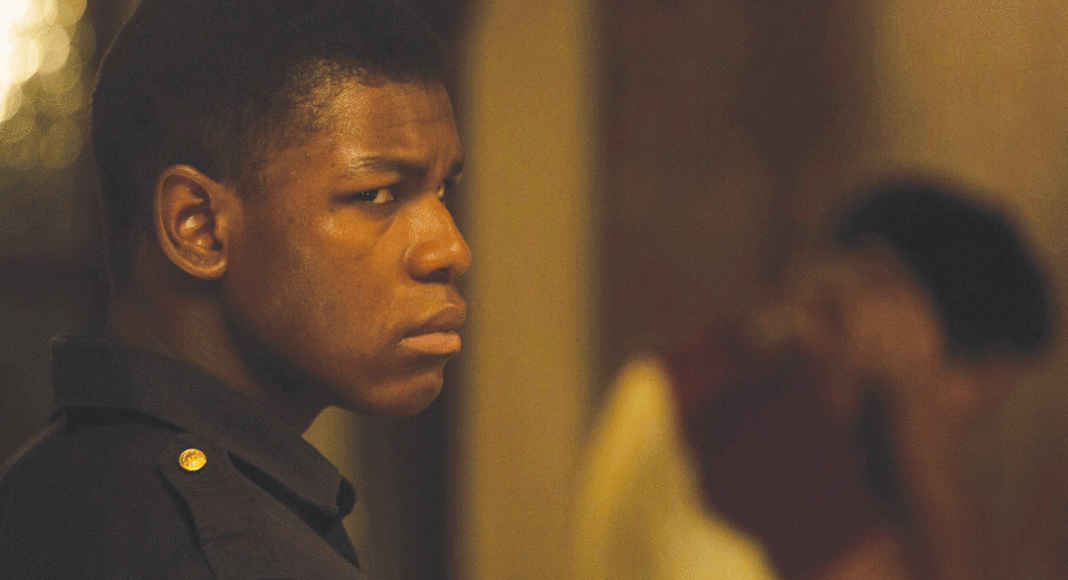Both commemorative and zeitgeist-filled, Detroit is the angriest movie Kathryn Bigelow has ever made. Although she deserves the praise she got for The Hurt Locker, in Detroit, she reverses Zero Dark Thirty’s coziness with “enhanced interrogation.”
An animated sequence describes the black diaspora to the north that made Detroit what it was by 1967—a company town with strictly delineated African-American ghettos, patrolled by a 90-percent white police force.
By the opening, before the rebellion begins, we’re completely on the side of the rebels. The cops raid an illegal after-hours club, but they can’t get in through the chained-up back door, and have to roust the suspects out on the street. There are a lot more celebrants inside than they’d expected, and the cops lose control. The tempo increases, in incidents caught by camerawork meant to recall Arriflex camerawork: we see a face in the crowd, smoking a cigarette and sizing the cops up fearlessly, a joker yelling at a friend he sees being hauled out in handcuffs: “Hey, you alcoholic …” And then the Molotov cocktails start to fly.
After this carnival, we meet a main character, Melvin Dismukes (John Boyega) who is about to start his 17th hour of work, moonlighting as a security guard. Boyega is big, intensely restrained, and looks like a peacemaker—we can follow his presence through the chaos to come. Bigelow’s trick on us is that no matter what Dismukes looks like, he’s unable to stop the trouble he witnesses. Meanwhile Larry (Algee Smith) and Fred (Jacob Latimore) of the real-life band The Dramatics meet backstage for a big show at the Fox Theater—The Supremes (or a lookalike group) are opening for them, or would be if the show weren’t canceled.
Avoiding the patrols, Larry and Fred duck into a nearby hot-sheet motel. The sight of the neon Algiers Motel sign makes the long-memoried viewer’s stomach turn over. The Algiers Motel incident—New Yorker’s John Hersey did a book on it—is still officially unsolved.
As presented here, what happens is like a long home invasion. Will Poulter plays Krauss, the inept patrolman in charge, a fictional composite. Poulter has the serpentine eyebrows of Jack Nicholson—he could play the young Michael Keaton, too—and he brings a surprise to every scene. Playing a dedicated ethnic-hater, actors usually go big. The fear on this callow fool’s face is barely concealed.
Detroit gets caught up in its ordeal of beating, mock executions and ultimate murder—at half the length, it would have had twice the power.
Bigelow proceeds the overnight ordeal with an unusually fun sequence. Two visiting Ohio girls (Hannah Murray and Kaitlyn Dever) tease the musicians over to the motel’s annex. Here, as in the beginning, we see the headiness of life during a civil insurrection, seen from what seems like a safe place, a swimming pool with beer-drinkers enjoying themselves. Then, at an after party, some more drinking, some yakking about John Coltrane.
The fun ends when Carl (Jason Mitchell), who gets tired of the strangers in his room, plays a stupid practical joke. He’s trying to make a point about how white people don’t understand the ambient fear black people live in: “I’m just acting,” he smirks at the end. Yes, and you’ve been caught acting by the audience, even before you admitted it.
Liberal wishy-washiness is evident in this otherwise startlingly intense film. Bigelow is no political sophisticate, and insists there were good apples on the DPD. But this is one of her best films, and an ornament to this year’s cinema, as exciting a year as we’ve had in ages. Detroit matches in intent Get Out, the Ferguson, Missouri documentary Whose Streets? and Justin Chon’s drama Gook about the 1992 L.A. riots.
She balances her startling force with sensitivity and sensuality. It’s said you can never make an anti-war movie, that some of the thrill of battle will leak into even the most pacifistic film. Give Bigelow credit—this certainly isn’t an anti-rebellion movie.
DETROIT With John Boyega, Kaitlyn Dever, Jacob Latimore, Jason Mitchell, Hannah Murray and Algee Smith. Written by Mark Boal. Directed by Kathryn Bigelow. Rated R, 143 Mins.













